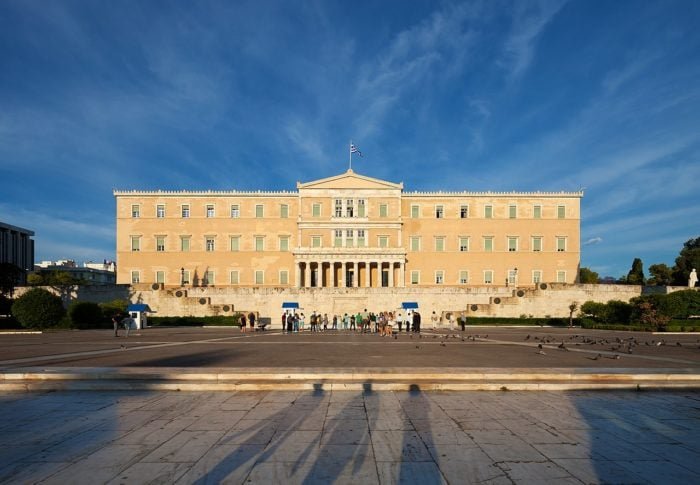
In the 1990s, the Greek government introduced a series of subsidies for certain categories of public sector employees that, by most standards, seemed excessive or even absurd.
When the Greek Socialist Party (PASOK), led by Andreas Papandreou, won the national election on October 10, 1993, it marked the third time since 1981 that Papandreou had been elected to lead the country. He defeated New Democracy leader Konstantinos Mitsotakis, who had served as prime minister from April 1990 to October 1993.
The PASOK leader brought major changes to Greece’s fiscal policies. In sharp contrast to Mitsotakis’ more conservative approach, he increased public spending, raised pensions and public sector salaries, and expanded the power of labor unions. However, these policies led to rising inflation, which the government attempted to counter by further increasing public sector wages and pensions.
Some of these increases came in the form of what are now remembered as the infamous PASOK-era subsidies—many of which are viewed as irrational or excessive by today’s standards. Pressure from unions, combined with the government’s willingness to appease politically aligned labor groups, led to the creation of numerous questionable subsidies.
Still, it’s worth noting that certain targeted subsidies have long been used as a way to boost employee income without raising official salaries. Since pensions are calculated based on base salary alone—not total monthly income—this approach allowed employees to earn more during their careers without significantly increasing the state’s long-term pension obligations.
Ten Greek government subsidies that seem unreal today
Some government subsidies once granted to public sector employees in Greece sound almost fictional now. In some cases, these allowances amounted to up to 40 percent of an employee’s monthly salary. While certain subsidies—like those for heavy or unsanitary labor—were reasonable and continue to exist today for specific roles, others defied common sense, at least to anyone outside of the public sector.
Below are ten of the most eyebrow-raising examples, most of which were introduced prior to the Greek financial crisis.
-
Timeliness subsidy – This one is the most infamous of all. Introduced in the 1990s by PASOK, this bonus rewarded employees simply for arriving to work on time. It started with 1,790 employees of the ETHEL (pollution-free bus company), who received the equivalent of €310 ($360) per month. Later, a similar €120 ($140) monthly bonus was extended to all public sector employees.
-
Fax handling subsidy – A whopping €870 ($1,020) per month was paid to 657 employees of the Public Power Corporation (DEI) for handling fax machines—technology already considered mundane even at the time.
-
Handwashing subsidy – Precisely 1,987 employees of the Hellenic Railways Organization (OSE, now Hellenic Train) were granted €420 ($492) per month for keeping their hands clean while on duty.
-
Envelope carrier subsidy – A €290 ($340) monthly allowance was given to 6,800 clerks in ministries and public agencies for carrying paperwork between offices.
-
Cafeteria use subsidy – ELPE (Hellenic Petroleum) employees received €120 ($140) per month to use the on-site cafeteria—essentially a dining bonus.
-
Propeller subsidy – A mysterious allowance of €840 ($985) per month was paid to 653 employees of the Port Authority, supposedly due to their proximity to ship propellers. As any Greek Shipping Minister might say, “All ships have one!”
-
Public bus delivery and pickup subsidy – Around 1,100 employees of the Ministry of Transport received €450 ($528) per month for the state’s routine delivery and reception of new public buses.
-
Antenna subsidy – A hefty €1,120 ($1,313) per month went to 329 drivers of the traditional yellow trolleybuses in Athens, who occasionally had to reconnect the antenna to overhead wires when it became detached.
-
Car warm-up subsidy – Around 420 employees of the Hellenic Telecommunications Organization (OTE) received €690 ($808) per month to warm up company cars before heading out for fieldwork.
-
Efficient case processing subsidy – Ministry of Justice employees were granted €595 ($698) per month as an incentive to process cases more efficiently. One might assume that’s already part of the job description.
Rampant inflation, easy bank loans reshape economy
Beyond the substantial subsidies provided by the Greek government—which boosted the spending power of public sector employees—the banking market experienced significant liberalization. Banks began handing out loans and credit cards with minimal guarantees, while interest rates soared above 20 percent. Cold calls offering loans and credit cards became common. Greeks, who had previously been unfamiliar with the use of plastic money, were captivated by the tempting offers of instant funds repayable over two or three years.
This created an illusion of affluence among Greek citizens that defined the mid-1990s and beyond. The absurdity of the banks’ loan policies at the time is evident in flyers advertising loans of 1,000,000 drachmas (a little over €3,000 or around $3,500) for a brief vacation in Paris or New York. The term “holiday loans” became a catchphrase, symbolizing Greeks’ consumption folly—a habit that would ultimately destroy households and businesses a decade later. With inflation running rampant, this false sense of wealth also reached Greek farmers, who received European Union subsidies that encouraged declining productivity, often spending the funds on luxury cars instead.
Meanwhile, manufacturing continued to lose ground to the service sector, especially tourism, which was promoted as Greece’s new “heavy industry.” Thousands of households, fueled by this euphoria, mortgaged their future incomes for decades without anticipating the looming crisis. It all came to an end by 2011, when the economic crisis hit hard. Greece entered a period of austerity and had to borrow from the European Commission and the International Monetary Fund to repay nearly two decades of debt incurred by frivolous spending that created a false sense of prosperity.
Yet during those years of subsidies and loans, all of this seemed insignificant. Greek citizens were swept up in a whirlwind of joy and optimism for the new millennium. All they needed was a loan to go on vacation and to pack their brand-name bags so they could fly off to a fantasy land of white and blue. It was a short trip but one they would remember forever—as social media can attest.


